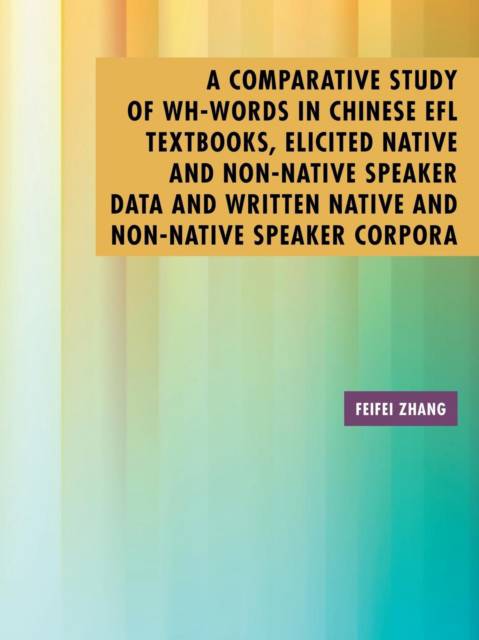
- Afhalen na 1 uur in een winkel met voorraad
- Gratis thuislevering in België vanaf € 30
- Ruim aanbod met 7 miljoen producten
- Afhalen na 1 uur in een winkel met voorraad
- Gratis thuislevering in België vanaf € 30
- Ruim aanbod met 7 miljoen producten
Zoeken
A Comparative Study of Wh-Words in Chinese EFL Textbooks, Elicited Native and Non-Native Speaker Data and Written Native and Non-Native Speaker Corpora
A Thesis Submitted to the Graduate School of Humanities of the University of Birmingham for the degree of Doctor of Philosopy
Feifei Zhang
Paperback | Engels
€ 21,45
+ 42 punten
Omschrijving
This study presents a corpus-based analysis of the use of "wh" sentences by language learners, in language textbooks and in authentic written discourse. It focuses on the polysemeous nature of "wh" words, which can be used as interrogatives, declaratives and to introduce subordinate clauses. The analysis of "wh" sentences in EFL textbooks showed that there are more prototypical examples at low proficiency levels. When teaching the interrogative, textbooks focus almost exclusively on grammatical words, particularly at the beginners' level. The analysis of "wh" sentences elicited from Chinese speaking learners of English and Expert users of English suggested that the prototypical structure is very strong in both sets of data, although native speakers tend to use more prefabricated chunks of language. The analysis of "wh" sentences from native speakers and non-native speakers' written corpora suggested that subordinate clauses are strongly present in both corpora, except for the word "why" in non-native speakers' data. The use of different words occurring immediately after "wh" words in the two corpora can be explained by (1) the relatively small vocabulary size of the L2 speakers; (2) non-native speakers' lack of awareness of restricted collocations; (3) L1 transfer; (4) over/under-generalization of rules and (5) textbooks.
Specificaties
Betrokkenen
- Auteur(s):
- Uitgeverij:
Inhoud
- Aantal bladzijden:
- 298
- Taal:
- Engels
Eigenschappen
- Productcode (EAN):
- 9781504910859
- Verschijningsdatum:
- 24/06/2015
- Uitvoering:
- Paperback
- Formaat:
- Trade paperback (VS)
- Afmetingen:
- 210 mm x 279 mm
- Gewicht:
- 675 g

Alleen bij Standaard Boekhandel
+ 42 punten op je klantenkaart van Standaard Boekhandel
Beoordelingen
We publiceren alleen reviews die voldoen aan de voorwaarden voor reviews. Bekijk onze voorwaarden voor reviews.











